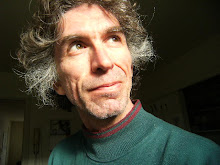Hope. How has that become a frightening word? Just leave it to me. Oh, what I can do with the happiest of words! Give me hope, but don't give me expectations. Don't give me an object of hope, just a feeling of it. Hope for what? I don't want to know. Hope is dangerous. I have to be careful what I hope. I have to hope small, local, and general. I can hope to stay in the moment, be myself. ("Didn't I say I don't want this?" suddenly rings as loudly in my head as if I'd just spoken it aloud. Its unbidden presence and ambiguous relevance is discomfitting.) I can't hope for Julie to initiate a conversation, or for anything else I can't control. I can't afford to infer or imbue. I can't think that I have an advantage or have made progress. Hope is on its own.
The more I write the more I want to explain and illustrate with specifics--events and scenarios real, imagined and hope-for--but I can't allow it. My mind wants to deconstruct and analyze, and I strain against the inclination. Writing is a dangerous compromise to that urge but an important challenge: I have to write--though in trying to justify that claim I can't untangle the rationalization--plainly and simply, I have to write. If I should ever question that need again, shoot me. The writing is not the challenge. The writing is about the challenge. No more about writing; the challenge is personal, not artistic.
What is the challenge, then? Having hope and not hoping.
Subscribe to:
Post Comments (Atom)



No comments:
Post a Comment